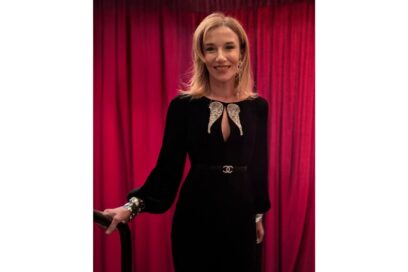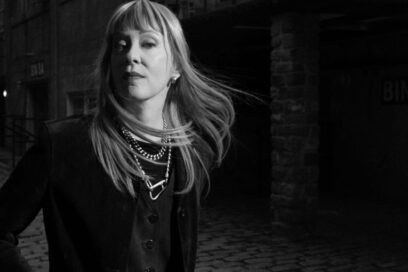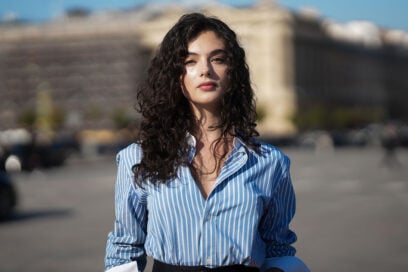Lucia Pica: "My vulnerability is my strength"

The light of Naples. Life in London and an overwhelming career in fashion and image. The angioma she didn't want and now proudly displays. Make-up artist and creative director Lucia Pica, guest editor of this issue, tells writer Valeria Parrella about herself. And the power of always being able to show the most authentic beauty
I meet Lucia Pica in Naples, in a historic bookshop in Port'Alba, the little street of second-hand books. Monica and Fabio host us, offer water, coffee, and silence. Lucia is like her name: all bright, and like her work on make-up, and like the city that gave her her origins and from which it is nice to leave and to which it is nice to return. Even if we simply talk about the light of Naples, when you have been living in London for 23 years: you come back and see the orange and pink light of the afternoon. When I come back, I also feel the density of the air that takes me straight back to summer afternoons: I am very romantic. The other thing that I am crazy about is that just by walking this stretch of road to reach you, I’ve caught so many conversations between people.
Naples is a place without privacy.
«When I went to London, I thought exactly this: I put on my yellow pajama bottoms and no one would judges me. But later, as you grow up, you miss the sense of community that you can find here: in London, you don't even know your neighbor».
And in your artistic training, there is indeed a neighbor.
«Yes! When I was 10 years old, I used to go to my neighbor who had a drawer full of make-up: I would sneak in make-up and then, before going out, I would remove it’».
Did you already have this career in mind at that time?
«No. I really didn't know what a career was. I had always been interested in fashion, even as a child, but I wanted to study Conservation of Cultural Heritage. There was a magazine that used to have cards of the Impressionists and I would collect them, but I didn't consider myself creative».
You discovered it in London, years later.
«I left when I was 19, after graduating from high school, like everyone else, looking to gain experience. A friend of mine told me: “You always do your make-up so well”, and she found a course for me. I had only been attending it for a month when the teacher said: “You have something special: we have an agency, we can put you on a film set to get work experience”. So I ended up on a James Bond set. Every time I met a make-up artist I asked if I could help».
Tell us about the time when you stalked Charlotte Tilbury, one of the world's most respected make-up artists.
«Naively enough I called her agent for a year, she would say, “Call me back”, and I really did. Later she became, along with Charlotte, one of the most crucial women in my career. Her name is Ayesha Arefin. A year later, one night, I was on the bus and she called me and asked: “Are you free tomorrow?”. And I said yes without even having to think about it, I was ready to give up my job, I would have done anything. I still get the chills. From there, Charlotte made me join her team and, after two years as her assistant in the fashion shows, she took me on as her first assistant».

Then?
«After eight years I became the creative director of Chanel. In six years I created several collections, all the beauty, fashion shows and fashion campaigns. Now I have been working with Byredo for three years: I am in charge of their image and make-up».
What does your creativity need?
«Everything that's around me: an exhibition, a piece of paper in the street, conversations, but sometimes also boredom. I need to be bored because it triggers the urge inside me to escape from that situation of stasis and so many things come to mind».
And how do you build a collection?
«It is a mixture of abstract and methodical inspiration. I always try to put something personal into the collections. Whether it is an emotion or a part of my story. I always found that the most personal choices have the power to carry vibrations further and touch people deeper».
What is the element that ends up most often in your collections?
«Vulnerability: it is the most intimate moment, when you really show yourself, it is the place where you can fall in love, it is the meeting point. Because by showing vulnerability, we can create deeper relationships».
Give me an example.
«Look at my angioma. When I was little I wanted to be all white, I didn't want to be red and white. I used to say in my prayers, “Jesus, will you make me wake up all white?”. But then, thanks to my brothers, who defended me, my three musketeers, and thanks to the people I met in life, I became so familiar with this part of me, that now I meet people who say to me:«Do you know that I didn't realize that? This hand goes on people's faces: so my vulnerability becomes a moment of encounter».
And how does all this flow into your make-up?
«For example, I did a collection of reds. With a lipstick on my cheeks, I feel like I got excited’.
Do you prefer the mirror of Narcissus reflecting himself in it, or the mirror of Alice walking through it?
«Both. The mirror helps you to treat yourself well and feel better. When you've taken care of yourself, when you've informed yourself, fed yourself, and done your yoga, you start from a good base that you like and then the make-up arrives, which is a nice way to have a moment with yourself. Those 10 or 15 minutes that you don’t have to see as: “I look horrible, I have to cover myself” but as: “How nice, now I'm going to put this red pencil on my eyes”. I believe in make-up as a moment with yourself and as a form of expression, not as a form of erasure» .
What is the form of erasure?
«On the Net there are tutorials where you use a disproportionate amount of make-up: we don't see you under there anymore. I believe in transparency and respect for individual traits. When I make up an actress or my mother, I have an idea: but when I start working on that face, I take a different path. I don't want to make your nose different. Do we always have to think about the perfection of canonical beauty or can we all see ourselves more beautifully?».
Cosmetic surgery yes or no?
«Everyone does what makes them feel good. What is unhealthy is to dictate a law outside ourselves, which creates insecurity in people. I can give you tools with which to beautify yourself while enjoying yourself without thinking«I must’ be this way».
The opposite of st be’ is free choice.
«Exactly, let's talk about choice for a moment, a word that is really close to my heart: it happens every time around something that makes you vulnerable. And the choice is not to be the victim of this thing. I remember well that choice has to be made regularly, when I was younger going from a long-sleeved jumper to a short-sleeved shirt was the moment of choice, the moment when I thought: ‘I will be seen, maybe judged’. So there was a moment when I chose to ride my vulnerability. It also happened to me here, in this issue of Grazia, looking at the cover photos. At first I chose one a little more.... How would you say… Imperceptible. Then, with the editor Silvia Grilli, I allowed myself the one in which I am most exposed: one in which I ride the emotion of my vulnerability».
What is the most tiring thing about your job?
«It takes place in an environment that, because of ego or insecurity, can hurt other people's sensitivities. It is competitive and plays on others. There was a time when I felt it a lot. Now that I had so many experiences that taught me how to manage fear, I don't feel it anymore».
The most difficult thing?
«It's the beginning. Once I start I know that I will find a way».
The most beautiful thing?
«The energy. There is an energy that makes me happy again and again and again».
Words by Valeria Parrella
Photographer Antoni Ciufo
Stylist Salomé Rouquet
© Riproduzione riservata



